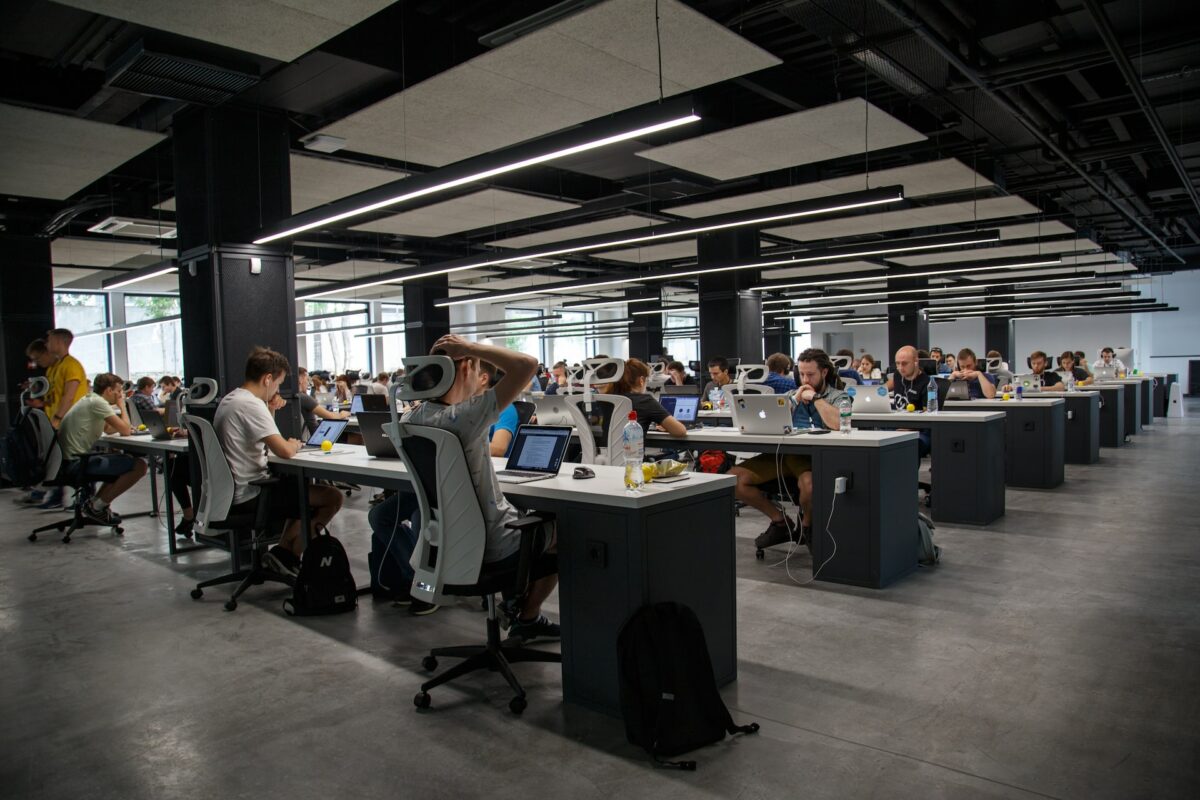How Is OpenAI’s ChatGPT Expected To Change Recruitment

Artificial intelligence (AI) has long promised to make our working lives easier and save time. It appears to be on the verge of having a significant impact on the recruitment process. Much artificial intelligence has been created to complete specific tasks, but a new tool, OpenAI’s ChatGPT, promises to answer questions, complete tasks, and write text on any topic, allowing hiring managers to leverage it within the hiring process and recruitment.
So, how is OpenAI’s ChatGPT going to change recruitment processes and recruitment strategy, and help small businesses, recruiters and hiring managers?
Quick Links:
- What Is OpenAI’s GPT-3?
- Can OpenAI’s ChatGPT Product Write Job Descriptions?
- ChatGPT For Candidate Outreach
- ChatGPT For CV And Resume Screening
- Candidate Matching With ChatGPT
- Scheduling Interviews With ChatGPT
- Preparing Interview Questions With ChatGPT
- Ethical Considerations And Bias In AI Recruitment
- Integration With Existing HR Systems And Workflows
- Future Developments In AI And Recruitment
- Training And Skills Development For HR Professionals
- Legal And Compliance Issues In AI-Assisted Recruitment
- Will Artificial Intelligence (AI) Replace Recruiters?
- Recruitment With ChatGPT FAQs
Highlights And Key Takeaways:
- OpenAI ChatGPT is a large language model that utilises artificial intelligence and machine learning to conduct human-like conversations.
- OpenAI recruitment tools and generative AI could help you craft job descriptions, screen job candidates and match candidate’s skills, generate suggested interview questions, assess the job market, and conduct other writing tasks.
What Is OpenAI’s GPT-3?
OpenAI’s GPT-3 is a third-generation Generative Pre-Trained Transformer. It is a highly-trained chatbot that uses artificial intelligence, machine learning (deep learning and reinforcement learning), language models, and internet data to create human-like conversations in a continued dialogue through the ChatGPT tool. You can ask ChatGPT to perform various recruiting tasks and ask follow-up questions if the response isn’t as expected or if you need further information.
Can OpenAI’s ChatGPT Product Write Job Descriptions?
ChatGPT can write a job description for a particular role. We asked ChatGPT to write job descriptions and found it could produce a generic job description with ease. However, to find qualified candidates for job openings, you must give ChatGPT more context than just a job title. You must add specific and unique aspects of the job role, such as current projects, objectives, business strategy, and required qualifications, expertise, and knowledge. Furthermore, job descriptions are unlikely to attract the best candidates unless you create engaging content that promotes your company culture and benefits such as flexible or remote working.
This blog post explores the topic of how good is ChatGPT at writing job descriptions. In this blog post, we asked ChatGPT to write a Catering Sales Manager job description and Data Architect job description, providing an example of how you can get ChatGPT to make job descriptions more engaging and include role specifics.
ChatGPT For Candidate Outreach
While ChatGPT cannot search social media platforms or other online platforms for potential candidates, it can help your recruitment efforts by writing outreach emails when you identify potential candidates:
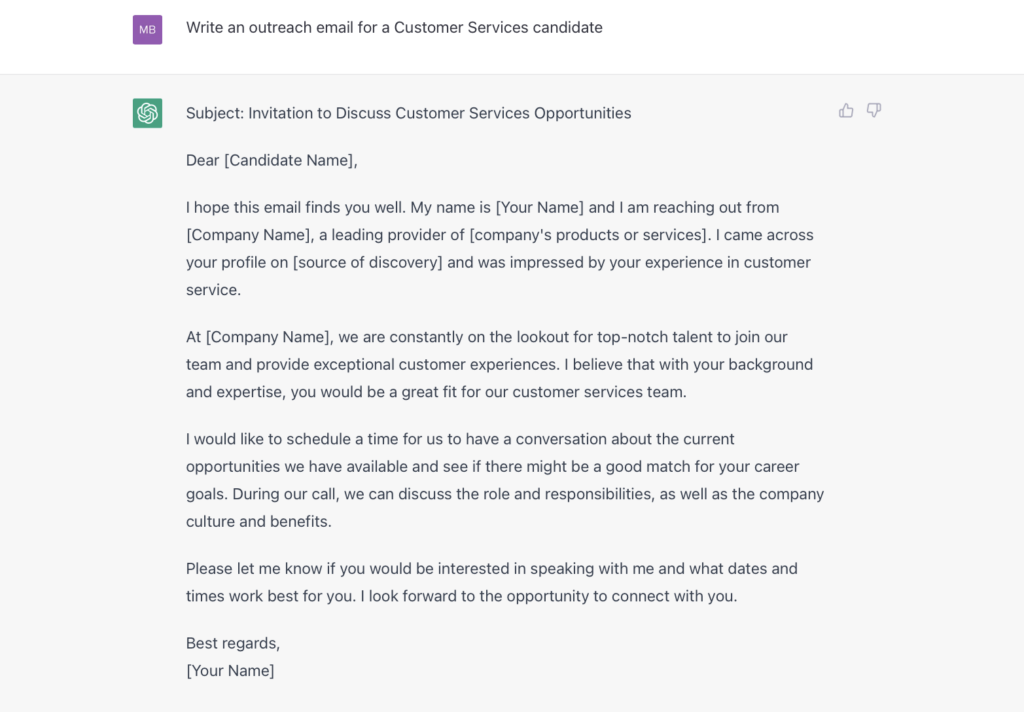
If the result is a little dry for your tastes and employment brand, you could ask ChatGPT to write a fun and unique outreach email:
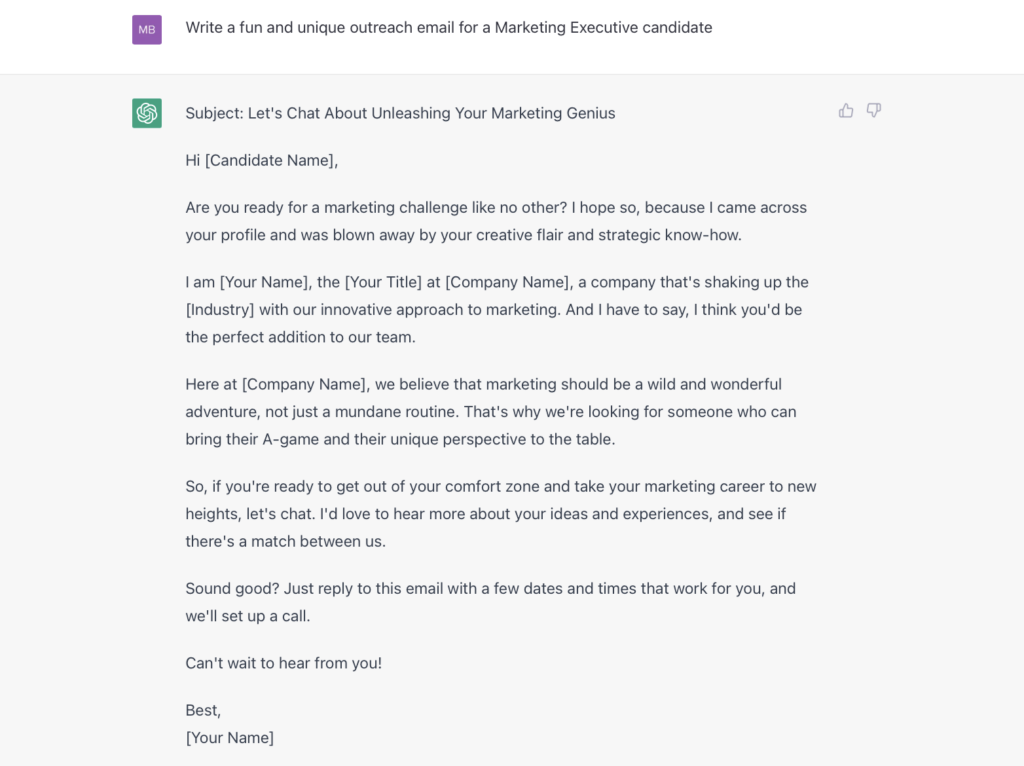
ChatGPT For CV And Resume Screening
ChatGPT cannot store or access digital documents, which means it cannot organise or screen resumes or CVs on your behalf. It does have the ability to identify areas to focus your attention on when manually screening, such as the skills, experience, and qualifications relevant to your jobs.
Candidate Matching With ChatGPT
ChatGPT can aid in candidate matching. Firstly, you can ask ChatGPT to summarise a CV, to make matching candidates more straightforward. However, you may risk overlooking candidates with great personalities if you take your human intuition completely out of the mix.
Secondly, you can ask ChatGPT to assess the suitability of a candidate against a job brief, by pasting both sets of data into the online platform. ChatGPT can even produce a list of pros and cons for potential candidates.
Scheduling Interviews With ChatGPT
While ChatGPT cannot physically schedule job interviews for potential candidates, it can aid your recruitment process by creating email templates or advising you on interview best practices.
If your company aims to improve its recruitment processes, we recommend reading our guide on centralising recruitment with ATS. Companies can use our Automated Tracking System and recruitment technology to automate job posting, import and organise CVs (including the cover letter), send out rejection emails, schedule job interviews, create a searchable talent pool database, and create recruitment reports.
Preparing Interview Questions With ChatGPT
Preparing interview questions can be time-consuming and ChatGPT can answer your questions about interview questions, as well as create a list of role-specific questions for you to ask candidates.
For example, we asked ChatGPT what questions should you not ask during a job interview:
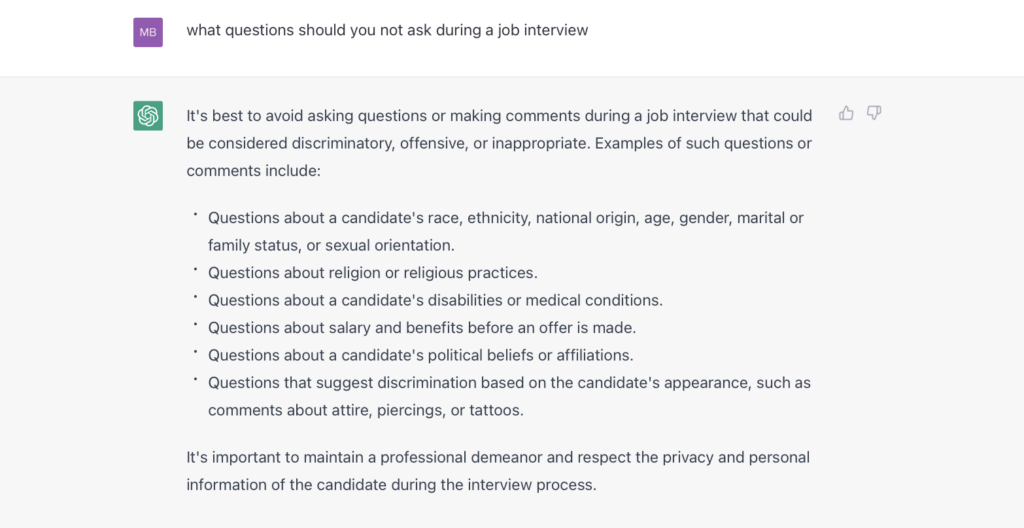
Getting specific, we asked ChatGPT to give five great interview questions to ask a Data Engineer in a job interview:
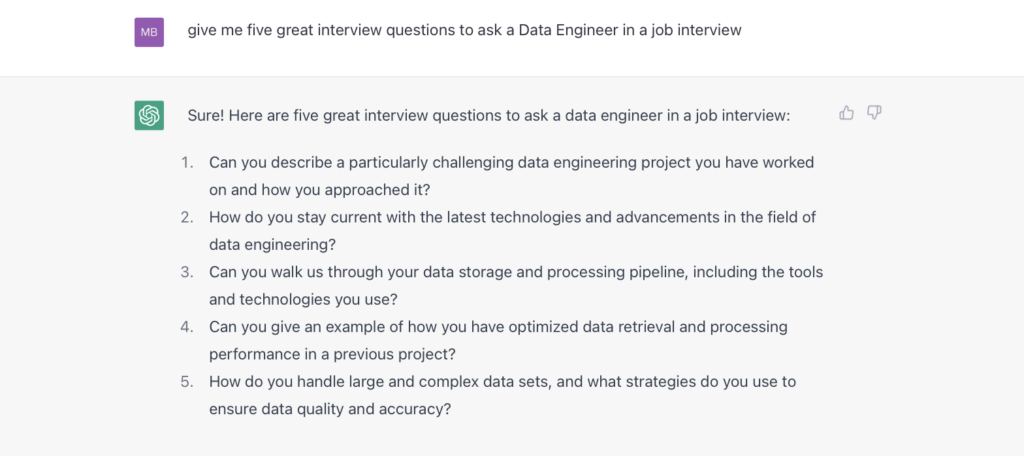
The questions are relevant but fairly general, so if you want to find the right candidates for your job opening, you must adapt these questions so they relate to your open positions, company, projects, and team. If you have a superb job description, you can ask OpenAI’s technology to ‘write interview questions for this job description.’
Ethical Considerations And Bias In AI Recruitment
As OpenAI’s ChatGPT becomes integral to recruitment, it’s imperative to consider ethical implications and potential biases. When using generative AI for crafting job descriptions or screening candidates, there’s a risk of perpetuating unconscious bias, leading to inappropriate outcomes. Large language models used in OpenAI recruiting, like ChatGPT, may replicate existing biases from their training data. Thus, it’s crucial to train ChatGPT to produce inclusive job descriptions and appropriate interview questions, mitigating bias and maintaining a human touch in the recruitment process. This approach is essential for allowing recruiters to focus on building relationships and enhancing the overall candidate experience.
Integration With Existing HR Systems And Workflows
Integrating OpenAI’s ChatGPT into existing HR systems can enhance the recruitment process, automating mundane tasks such as screening candidates or generating job posts. However, human intervention remains critical to preserve the human connection in recruiting. While ChatGPT can assist in initial candidate screening, human insight is vital for final hiring decisions to ensure they align with company values and enhance the employee experience. Careful integration of ChatGPT-supported technology is necessary to augment, rather than replace, the human elements of recruitment.
Future Developments In AI And Recruitment
The future of AI in recruitment, especially with OpenAI’s ChatGPT, is poised for significant advancements. Enhanced natural language processing capabilities will allow for more sophisticated interactions with job seekers. AI tools could be increasingly used for complex tasks, such as assessing candidate skills through cover letters or generating relevant questions for interviews based on a candidate persona. As ChatGPT evolves, its role in candidate engagement could expand, influencing everything from job advertisement to final hiring decisions.
Training And Skills Development For HR Professionals
With the rise of ChatGPT in recruitment, HR professionals must adapt by developing new skills. Training should focus on effectively using AI tools for tasks like crafting inclusive job descriptions and screening candidates, while emphasizing the importance of the candidate experience. HR professionals should also learn to identify and mitigate unconscious bias in AI model outputs. The aim is to equip HR personnel with the skills to balance the efficiency of AI tools with the essential human touch in building relationships and enhancing the candidate experience.
Legal And Compliance Issues In AI-Assisted Recruitment
Utilising AI in recruitment, such as OpenAI’s ChatGPT, involves navigating legal and compliance issues. It’s essential to ensure that AI use in tasks like crafting job descriptions or screening candidates complies with data privacy laws and regulations like GDPR. Additionally, employers must be vigilant about AI potentially introducing unconscious bias into the recruitment process, which could lead to legal challenges. Employers must ensure that their use of AI in recruitment is transparent and includes human intervention in key decision-making processes to maintain fairness and compliance.
Will Artificial Intelligence (AI) Replace Recruiters?
The short answer is no, or at least not in the near future. AI recruiting tools can help save time on tasks such as writing job descriptions and talent acquisition but companies require a human to add heart and oversight to all communications, marketing materials, and recruiting decisions. Without the human element, no recruiter is going to attract the best candidates to their job openings, let alone build relationships and a diverse pool of talent.
Technology such as artificial intelligence and augmented reality should work with recruiters, not replace them.
Recruitment With ChatGPT FAQs
Here we answer your questions on how ChatGPT and similar technology will help the recruiting industry and hiring process.
Artificial intelligence (AI) is changing the recruitment process with ChatGPT and other online platforms assisting companies who wish to prepare descriptions for job opportunities, draft outreach emails, and prepare for the interview process.
The recruitment industry will become more efficient and could save costs by using AI to complete basic HR admin tasks. However, it risks becoming impersonal and a key role of HR will be to oversee the hiring process and make the ultimate decisions on validating potential candidates/qualified candidates.
The latest trends in the recruitment industry suggest recruiters must adopt automation and embrace innovation and technology. Routine tasks in the hiring process that require little human involvement may simply be overseen by a recruiting professional, while more complex tasks will see AI act as part researcher, part virtual assistant.
Recruiters are unlikely to be replaced by robots, now or in the near future. AI recruitment technology and sourcing tools suffer from a lack of human interaction and a company must decide when, where, and how it is appropriate to use such online platforms and AI technology. Risks include the potential for bias, providing inappropriate responses that could cause candidate frustration, and overlooking top candidates that experienced recruiters would otherwise spot.
Hiring teams can leverage ChatGPT technology to streamline various aspects of the recruitment process, enhancing efficiency and effectiveness. As a generative AI tool, ChatGPT can assist in tasks ranging from writing emails to crafting job descriptions and recruitment marketing content. For instance, a hiring manager can use ChatGPT to generate interview questions, both suggested and specific, tailored to assess candidates’ skills comprehensively. This AI technology is adept at creating in-depth candidate profiles and providing salary benchmarking data, aiding in the decision-making process.Moreover, ChatGPT can be utilised to compose compelling job ads and other recruitment materials, ensuring they are engaging and accurately reflect the required hard skills and soft skills for the role. Another practical application is using ChatGPT to create Boolean search strings, which can significantly improve the efficiency of sourcing candidates. While ChatGPT can automate and enhance many recruitment tasks, it is crucial to maintain human oversight to ensure the relevance and appropriateness of AI usage. By combining the capabilities of ChatGPT with the expertise of the hiring team, the recruitment process becomes more efficient and effective, leading to better hiring outcomes.

